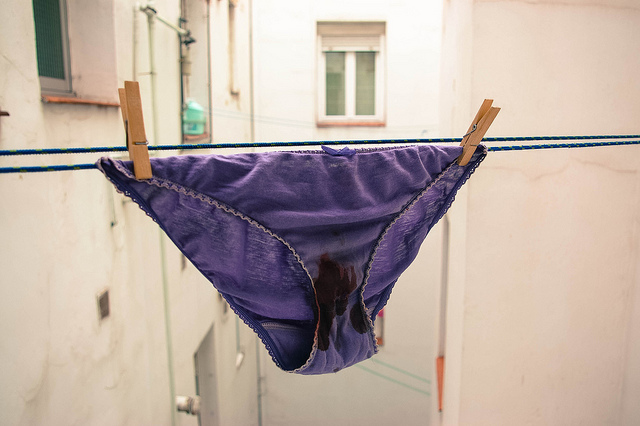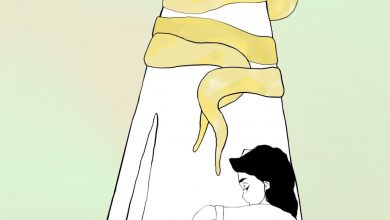The Silent Violence Against Menstruating Bodies

Image via Jorge gaelx on Flickr / CC BY 2.0
I got my period in October during my first year of middle school. My school didn’t allow backpacks in the classroom, so books and pencil bags were moved in and out of lockers between classes. This bag dilemma caused me a week’s worth of extreme embarrassment and anxiety each month. If I took my pencil bag to the bathroom, everyone would know I had my period. So, for one week each month I would carry a drawstring bag on my back with pads, hoping the small flimsy bag sat flat enough against my back that it went unnoticed.
Now that I’m older, I’m past that excruciating embarrassment. But grown people who menstruate face shame not unlike that which I experienced as a preteen. Remember, don’t you dare wear white pants unless you want to take a walk on the wild side.
The big corporate tampon companies advertise “high absorbency” with blue liquid rather than red blood and avoid the word “vagina” completely. Of course, some companies have caught on to the problem and adjusted their commercials to market tampons more realistically, but the general consensus on menstrual blood seems to still be that it’s something dirty, something that needs to remain invisible.
Unsurprisingly, the mystification of menstruation has a greater effect than is acknowledged. The socially-enforced silence on menstruation creates shame and humiliation while simultaneously suppressing the discrete physical and psychological violence being inflicted on menstruating bodies.
Violence, in this sense, is similar to that faced by bodies who are denied access to abortion and general reproductive care. This is violence based on the lack of choice, whether that be in the case of abortion, whether or not we choose to use menstrual products, or whether or not we feel conditioned to experience silent shame. We do not have complete ownership over our brains or our bodies.
The Free Bleeding Movement is one of several groups bringing awareness to the issue of menstrual shame by advocating for people’s right to menstruate freely and without criticism. While the cause of the movement is important, it fails to analyze the problem of violence that is enforced through what they actively advocate against — the social pressure of absorbing menstrual blood.
According to an article by The Establishment, “The medicalization of menstruation — the notion that there is something wrong during menses that must be corrected — is a ubiquitous phenomenon that rears its bloodied visage in all kinds of applications.”
And so an industry was born.
Tampons have a long, complicated history involving the discovery of their relationship to Toxic Shock Syndrome (TSS), the concealed, discrete menstrual shame advertised to sell menstrual products, and the horrific race to create the most absorbent product.
The embarrassment and filth associated with menstruation encouraged people who menstruate to call for more absorbent tampons.Thus in the 1970s, tampon companies raced to create the most absorbent product, which happened to be made with synthetic products associated with the rise in TSS. Today, the FDA has set “terms of absorbency” standards. You can get “light” and “regular, or “super” and “super plus” absorbencies, which are advertised on every tampon box we pick up.
Yet another danger of these products lie in the fibers that are left behind during the removal of a tampon. Moreover, many of us have experienced the uncomfortable pain of removing a semi-dry tampon, which leave more fibers than usual when the tampon is removed from the vagina. These fibers present the same risk that we’re told to avoid by not leaving in our tampons too long.
Throughout their corporate history, tampons have not been regulated, created, or tested in the best interests of the consumer. The FDA has historically avoided research, instead observing findings presented to them by big tampon companies — companies that are motivated by money and consumerism, rather than the wellbeing of their consumers.
The psychological and physical violence inflicted on menstruating bodies by tampon companies extends into the social realm where everyone knows about the natural processes menstruating bodies are cycling through, but expect “it” to remain invisible (especially cisgender men) — out of sight and out of mind.
The socially enforced invisibility invalidates the experiences, the pain, and the discomfort experienced by some menstruating bodies. People who menstruate are expected to continue on with their daily lives, at school or at work, without one complaint to the boss or teacher about any small amount of discomfort. We’re suppose to suck it up; pretend the discomfort isn’t there, just as our menstrual blood isn’t there. It doesn’t even matter if you’re not hurting — don’t talk about menstruation, period.
Other hot-topic social taboos include “period sex.” Having sex on your period is still seen as a kinky activity, just as giving oral sex to a person who is menstruating is absolutely unacceptable, yet cisgender, heterosexual men expect people to allow their bodily secretions (i.e. semen) to go wherever they please — on or in bodies they engage with sexually.
While this social and capitalistic inflicted harm affects all menstruating bodies, shame and humiliation aren’t considered to be emotional experiences that seriously impact our psychological well-being in the first place.
According to an article by Walter J. Torres and Raymond M. Bergner in “The Journal of the American Academy of Psychiatry and the Law,” “Suffering severe humiliation has been shown empirically to plunge individuals into major depressions, suicidal states, and severe anxiety states, including ones characteristic of posttraumatic stress disorder.” While some of this humiliation associated with “bleeding through” isn’t seen as severe, Torres and Bergner found that people with psychological conditions are even more vulnerable to the effects of humiliation.
Furthermore, shame is considered a natural human response, but this emotion can become more psychologically complex when it is felt for long periods of time. And each month, shame, disgust, and occasional humiliation is felt by people who are menstruating.
An article on PsychCentral by Holly VanScoy cited that “there’s mounting evidence that problems occur when shame or humiliation becomes an integral part of a person’s self-image or sense of self-worth. Over the past two decades, psychologists, psychiatrists and other mental health professionals have reported that abnormal styles of handling shame play an important role… in a [host of personal] and social problems.” The consistency of these emotions can damage our confidence, make us feel anxious, and take other psychological tolls, all the while normalizing these feelings for us.
So as young people are learning about menstruation through stigmatized language, they’re being taught about their natural processes in psychologically damaging ways, which contributes to problems with body image and other negative expectations preteen kids face.
Janet Allon, in an article published on AlterNet, presents the idea of activism regarding menstruation. Allon cites Chris Bobel’s “New Blood: Third Wave Feminism” where he claims, “We teach them that it is a hygienic crisis rather than what it is, which is an important gateway to talk about our bodies, our sexuality, our health, how we mature and age, as well as body image issues.”
Currently there are projects and organizations such as the Period Positive Project that are encouraging “unbranded” teaching to better education and challenge stigmas of menstruation created by the media. Artist Emma Arvida Bystrom published a series of photos under the title “There Will Be Blood,” which portrays people doing everyday activities while they visibly bleed through their underwear. While such projects gain momentum, there is still much work to be done to make the desired change inclusive.
Within intersectional feminist circles, there are concerns about the premise of the free bleeding movement. The movement is considered as frivolous compared to the devastating racism, police brutality, and white nationalism that causes Black and Brown bodies to bleed.
Furthermore, the language surrounding menstruation movements is presented through the gender binary, as can be seen in many of the links in this article. By assigning menstruation to “biological” women, the movement is tainted by transphobia and white feminism.
Lastly, the radicalization of free bleeding is critiqued because there are lower-class and homeless people who don’t have a choice when it comes to whether or not they use menstrual products — many do not have access to these products in the first place. None of these critiques are wrong. For the success of such a movement, these critiques should be recognized and integrated into current projects without silencing the free bleeding project.
The sweet, simple euphemism “feminine hygiene product” sums up the breadth of the violence inflicted on menstruating bodies in a nice little package. Cisgender (feminine) women are not the only people who menstruate. Menstrual blood is not unhygienic. It’s not a dirty little secret that needs to be euphemized. It’s one of many of our bodies’ natural processes. Essentially, the only time that menstruation becomes a “health” issue is when menstrual products and menstrual social norms inflict harm upon our bodies.
The emotional toll and stress that I felt every month during middle school wasn’t something I needed while going through puberty. The quiet violence I experienced contributed to about eight years worth of adolescent shame and embarrassment that I could only begin to analyze and rethink as a young adult.
It’s essential that we continue to find new ways to teach menstruation to young people who are menstruating — and those who will not — to protect the emotional well-being and bodily confidence of younger generations. Through a thoughtful, intersectional approach and discussion with preteens, regardless of gender, a well-rounded change in thought could occur and address the silent violence faced by people who menstruate.




